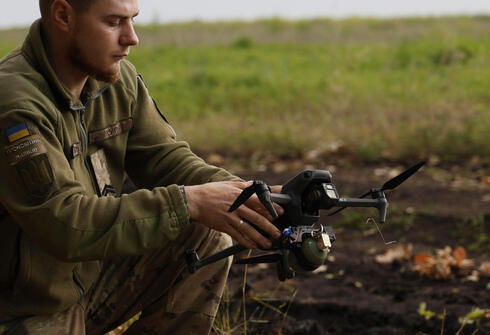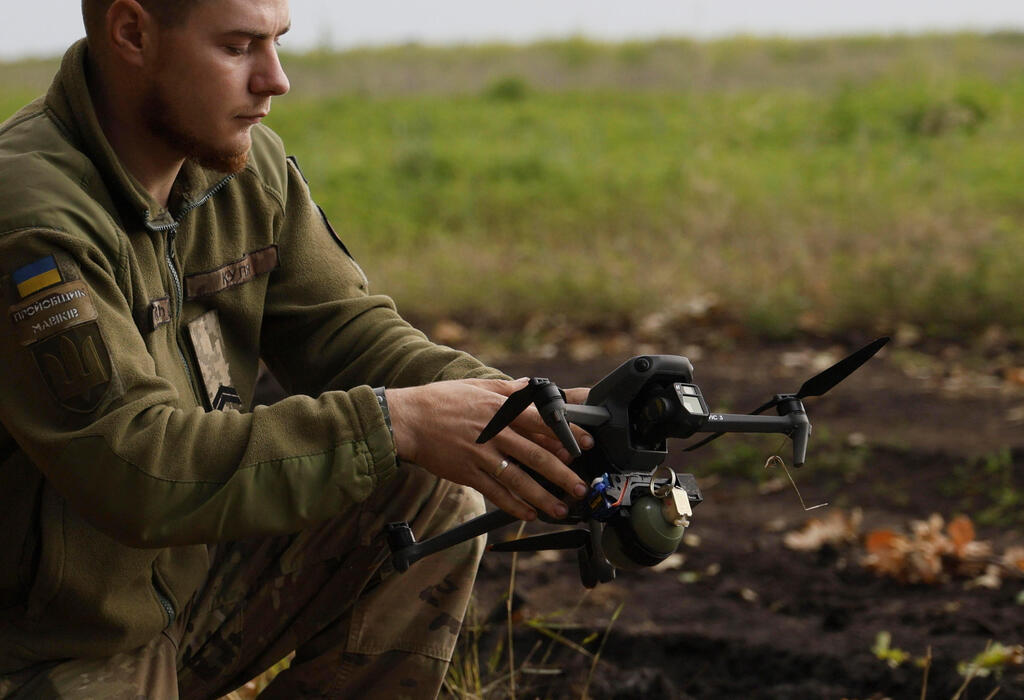
Starlink Wars: Musk controls battlefield from his office chair
Starlink, Elon Musk's Internet satellite company, dominates its sector and, among other things, enables the Ukrainian army to fight against Russia. The problem: one person holds extraordinary power to connect or disconnect large areas of the world
Knowledge is power - goes the well-worn but oh so accurate saying. And nowadays, the one who has his finger on the switch of knowledge and its transmission holds a great deal of power. The Ukrainian military forces fighting for their country's independence against Russia's occupation army have come to understand this well over the past year. In a country where the war has made traditional communication infrastructure (telephone and internet lines and cell antennas) unreliable to the point of non-existence - the Starlink satellite internet system, a division of Elon Musk's SpaceX, has become a strategic asset of the highest order.
"It’s the lifeblood of our entire communication system now," Ukraine's digital minister Mykhailo Fedorov told the New York Times. "The number of people Starlink has helped save is estimated in the thousands. It is one of the fundamental components of our success." A Ukrainian commander on the battlefield told the newspaper: "Without Starlink we can't fly, we can't communicate." Hospitals, aid organizations and businesses also rely on the system for their day-to-day functioning.
But this lifeline is controlled by one person who can, if he wishes, shut down the entire system - as he has done. Sources in Ukraine told The New York Times that on several occasions Musk had restricted the combat forces' access to the Starlink system. On one occasion, he rejected the army's request to use it near the Russian-occupied Crimean Peninsula in order to send a drone loaded with explosives to Crimea. Starlink cannot be used for long-range drone attacks, Musk explained. From his seat on the other side of the world, Musk influenced the strategy and moves on the battlefield. One person, thanks to a system he helped create, holds as much influence as that of the ruler of a country, and can, at the push of a button, turn a cohesive and organized army into a scattering of detached units.
The first Starlink satellites were launched into space in 2019, and are launched almost every week. Today, Musk has more than 4,500 active Internet satellites in orbit around the Earth, 50% of all satellites, which provide a satellite connection to about 60 countries. The ambition is to reach 42,000 satellites, which will provide worldwide coverage.
Although there are other players in the field, Starlink is the most dominant, and no other project, private or governmental, comes close to its scope of coverage. Amazon's Project Kuiper has yet to launch a single satellite. Britain’s OneWeb suffered significant financial difficulties and needed a financial rescue from the British government.
In war zones, remote areas or places that have suffered a significant natural disaster, it is often the only communication infrastructure. For Ukraine, this is a vital strategic asset, and the military used Starlink to coordinate drone strikes and gather intelligence. Activists in Iran and Turkey have used it to bypass local browsing restrictions and government surveillance, the US military is considered a major customer, and other militaries such as the Japanese military are testing the technology.
But even though it is a system of broad military and political importance, its control is ultimately very limited and is in the hands of one person: Musk, who, according to the "New York Times", can decide on his own whether to cut off access to Starlink to any client or country, and also to leverage the use of sensitive information that the satellites collect.
The control of the system by Musk, who last year promoted a "peace plan" in Ukraine that served the interests of Russia, raises considerable concerns in the country. They watched the conversation of the Supreme Commander of the forces in Ukraine, General Valerii Zaluzhnyi, with the chairman of the US Joint Chiefs of Staff, General Mark Milley, in March of this year. According to the "New York Times", Zaluzhnyi said in the conversation that decisions on the battlefield depend on the continuous use of the Starlink system, that Ukraine wants guarantees for continued access and its expansion to other areas.
At least nine other countries, including countries in Europe and the Middle East, have brought up Starlink in talks with American officials in the last year and a half. Some have expressed concern about the power Musk has over the technology. However, the fear of Musk among these countries is so great, cyber and intelligence sources tell The New York Times, that only a few agree to speak publicly about their concerns, for fear of a retaliation from Musk.
One company, under the control of one person, possesses extraordinary power to connect or disconnect large areas of the world, those where the need for stable and continuous communication is particularly essential, a matter of life and death, conquest or independence. And what is most disturbing, is that it did not have to be this way at all.
Satellite Internet is not the first satellite-based technology to shape our daily lives. Traditional communication satellites have been making the world a smaller place since the 1960s. These were initially launched into space by countries, and even today are considered an expensive business, partly because of their complexity and size.
But if we are looking for a better comparison to Starlink, it can be found in satellite navigation systems. The satellites of the first system, GPS (which became a generic name for the field), were launched in 1978 by the USA. In 1982 the Soviet Union joined with GLONASS, in 2000 China with BeiDou, and in 2011 the European Union with Galileo. These systems are the result of another era in space exploration, an era in which launches were a terrifyingly expensive business, one that only superpowers could handle, and in which the national interest in the utilization of space and the investments necessary for this was also greater. This led to the creation of life-changing and critical systems for the global economy that are controlled by states, and whose access to them is open to all without significant limitation.
Satellite Internet has the potential to become a critical everyday product similar to satellite navigation, but one born from a different place. The first attempts to launch such systems were made by private companies towards the end of the 1990's and the first decade of the 21st century, a period when the United States significantly reduced its investments in the exploration of space, and the Soviet Union no longer existed (hence the decrease in investments) but these failed due to costs and technical difficulties.
Musk and SpaceX, who entered the gap left by the USA and the USSR in space exploration, especially when it comes to innovation and the development of new capabilities, began developing (relatively) cheap reusable rockets in 2002, with Musk's interest in satellite internet even preceding the establishment of SpaceX . When he launched the first satellites, some argued that it was a failed vision. Two years later Musk proved them wrong when the system went into commercial operation. Today it is active in more than 50 countries, including the USA, Japan, most of Europe and part of Latin America. In Africa it is available in Nigeria, Mozambique and Rwanda, and by the end of 2024 it will be active in about a dozen more countries on the continent. Starlink has 1.5 million subscribers, including armies, telecom companies, airlines and shipping companies.
Starlink reached such success because Musk was the first to identify a government vacuum in a place where technology changes rapidly and the ability to innovate and reduce costs also allows private players to create a system with an impact or scope that once only countries could afford. The result is that the system that can launch the next generation of innovation and media progress is controlled by one person, who owes no explanation to anyone but himself.
Some countries are also starting to realize this. In 2020, China announced a plan to launch 13,000 of its own communication satellites. Last year, the European Union allocated 2.6 billion euros to build a satellite communication system for civilian and military uses. But it will take time for these plans to bear real fruit, and in the meantime Starlink continues to expand its dominance without any entity in sight that could threaten it. Amazon, which had planned to launch its first two internet satellites in May, had to postpone the launch indefinitely due to problems discovered with the rocket. Since then, Starlink has managed to launch almost 600 new satellites.














